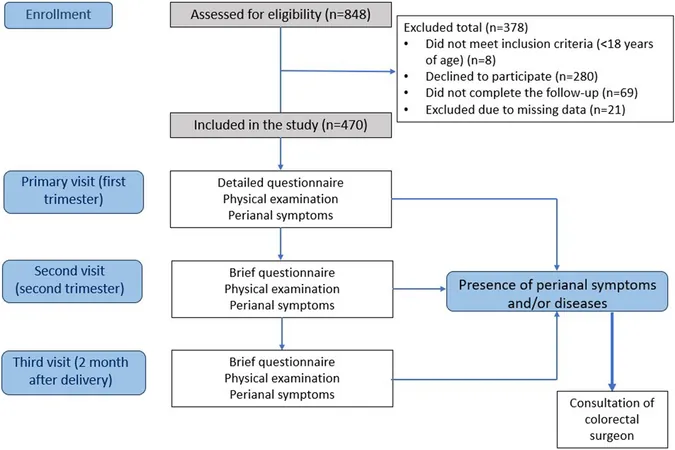
New Study Unveils Shocking Insights on Constipation Risk Factors During Pregnancy
2024-12-28
Author: Yu
Constipation is not only a nagging problem that millions face daily, but it also poses significant challenges for expectant mothers, with new research highlighting its prevalence during pregnancy.
A recent multicenter prospective cohort study has identified key risk factors associated with this common condition, which affects around one in three pregnant women.
According to the National Institute of Health (NIH), constipation is characterized by infrequent bowel movements—fewer than three times a week—with symptoms such as hard, dry, or lumpy stools and a sense of incomplete evacuation. This condition can lead to discomfort, pain, and significant emotional distress.
Who Is Most Affected?
Pregnancy-related constipation affects an estimated 30–52% of women after childbirth as well, with these figures soaring during pregnancy.
The study found that women over 35, those with higher education levels, and those with a pre-pregnancy body mass index (BMI) greater than 24 kg/m² are more susceptible.
Interestingly, the psychological state, including stress levels and certain occupations, also significantly influences the likelihood of developing constipation.
Moreover, the research noted that the likelihood of experiencing constipation increased in the first and third trimesters of pregnancy, indicating that these periods are especially critical for pregnant women.
But the findings didn’t stop there; the research revealed an intriguing link between constipation and the use of iron supplements—a common prescription during pregnancy.
Unpacking the Risk Factors
This study meticulously surveyed 848 pregnant women across three medical centers and analyzed risk factors that lead to constipation.
About 263 of the participants were diagnosed with this condition during their pregnancy or postpartum phase.
Intriguingly, women with a diagnosed history of hemorrhoidal disease were found to be at the highest risk, with an astonishing 40% reporting perianal symptoms such as pain and discomfort.
Key risk factors identified include: 1. **Hemorrhoidal Disease**: Women suffering from this disease experienced constipation nearly 8.25 times more frequently than those without it. 2. **Physical Activity**: Those who did not engage in regular exercise were more prone to constipation. Only 21% of women in the constipation group reported adequate physical activity. 3. **Income Level**: Women earning between 300 to 500 euros per month had a higher incidence of constipation. 4. **Educational Attainment**: Surprisingly, those with lower educational backgrounds showed a reduced risk, raising questions about lifestyle choices and awareness.
Just imagine, 40% of women developed some form of perianal symptom, predominantly dull pain—issues that can significantly disrupt daily life and postpartum recovery.
The Importance of Preventive Measures
The implications of these findings are profound.
They suggest that improving physical activity levels and managing hemorrhoidal health during pregnancy could play key roles in reducing constipation rates.
Educational programs aiming to inform pregnant women about the importance of physical exercise and dietary adjustments may prove beneficial.
Moreover, the study emphasized the need for healthcare providers to address gastrointestinal health as a standard part of prenatal care.
This proactive approach could help manage and mitigate risks, enhancing the overall quality of life for new mothers.
Conclusion
Constipation during pregnancy is far more than just a pesky inconvenience; it’s a significant health concern that can accompany emotional and physical pain.
As our understanding grows through studies like these, there is hope for targeted interventions and preventative strategies to aid expectant mothers.
The key takeaway? Don’t ignore your bowel habits—talk to your healthcare provider and tackle constipation head-on to ensure a healthier pregnancy journey!


 Brasil (PT)
Brasil (PT)
 Canada (EN)
Canada (EN)
 Chile (ES)
Chile (ES)
 Česko (CS)
Česko (CS)
 대한민국 (KO)
대한민국 (KO)
 España (ES)
España (ES)
 France (FR)
France (FR)
 Hong Kong (EN)
Hong Kong (EN)
 Italia (IT)
Italia (IT)
 日本 (JA)
日本 (JA)
 Magyarország (HU)
Magyarország (HU)
 Norge (NO)
Norge (NO)
 Polska (PL)
Polska (PL)
 Schweiz (DE)
Schweiz (DE)
 Singapore (EN)
Singapore (EN)
 Sverige (SV)
Sverige (SV)
 Suomi (FI)
Suomi (FI)
 Türkiye (TR)
Türkiye (TR)
 الإمارات العربية المتحدة (AR)
الإمارات العربية المتحدة (AR)